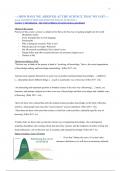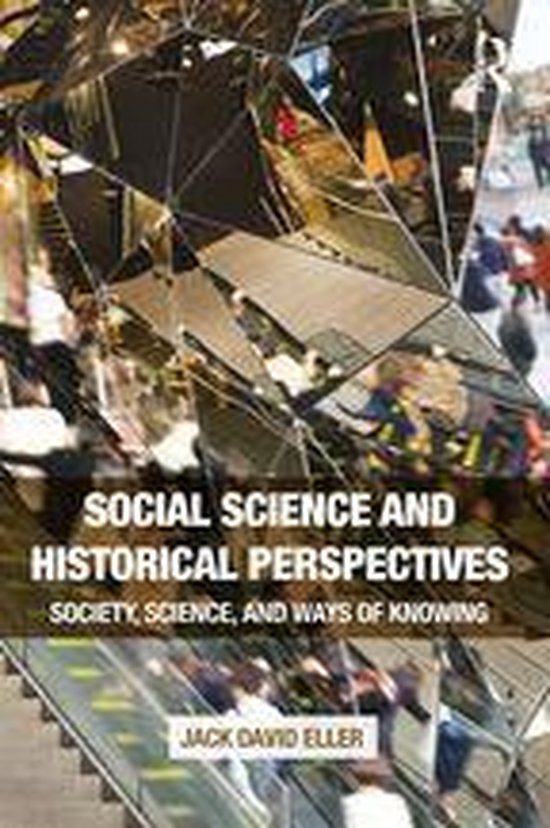1
→ HOW HAVE WE ARRIVED AT THE SCIENCE THAT WE GOT ←
[week 1] INSTITUTIONALIZATION OF SOCIAL SCIENCES I
Lecture 1: Introduction - the trustworthiness of social sciences questioned
Theme of the course
Premise of this course: science is, despite all its flaws, the best way of gaining insight into the world
- Disciplines matter
- Every discipline has its own language
- Positionality
- Who is doing the research? Who is not?
- Which topics do we study? What not?
- Not all research is published, like it doesn’t exist
- Things before and after research that have an enormous impact on us
- Choices in life
Themes according to Eller
‘The best way to think of the project at hand is “sociology of knowledge,” that is, the social organization
of knowledge-making and knowledge-transmitting.’ (Eller 2017: vii).
‘humans must organize themselves in some way to produce and disseminate knowledge […] different
[…] disciplines know different things […] each is a particular way of knowing’ (Eller 2017: viii).
‘An interesting and important question is whether science is the only way of knowing […] music, art,
literature, and perhaps religion have their own way of knowledge and their own unique and valuable ways
of knowing’ (Eller 2017: viii).
‘there are those who contend that only the natural sciences produce knowledge, in the form of theories
and laws. Such people may reject the “social sciences” as poor imitations’ (Eller 2017: viii).
‘Then there are those who assert that science is itself not a universal but a culturally-specific way of
knowing’ (Eller 2017: ix).
‘Finally, there are those who say that the current way of organizing knowledge –the contemporary
academic disciplines, the existing school and university systems, and the traditions of article writing and
book publication– are not the best way to construct and transmit knowledge’ (Eller 2017: ix).
Status of science: Case of Corona
- If we don’t flatten the curve, if we don’t take
measures (lockdown), we will have an enormous outbreak
, 2
- We must follow the scientific experts
‘Anthony Fauci (Trump’s Chief Health Commissioner)[…] has become the scientific voice of reason
about how to respond to the new coronavirus’ (Jon Cohen, Science 22 March 2020)
Christian Drosten, Ich habe Besseres zu tun ZSK, Ich habe Besseres zu tun
- Podcast millions on tabloid
- Scholar who disagree → that is how we progress in science
https://www.youtube.com/watch?v=5OZdKwFSWZw (song)
Jaap van Dissel; Diederik Gommers; Roel Coutinho
Status of science: Case of Oostvaardersplassen
- The science that we get as a society is determined by far more things than just the research itself
- So much more research is being done, but only some part circulates (is used) some doesn’t, some
is believed some is rejected
- Depends on status of scholars
Oostvaardersplassen: more than half of the 5320 grazing animals counted last October has died this winter
(www.NOS.nl 5 April 2018)
Historical overview
- 1968 land reclamation Zuidelijk Flevoland;
- Put out animals: 32 Heck cattle (1983), 20 Konik horses (1984), 44 red deer (1992)
- 2011 count: 360 Heck cattle, 1150 Konik horses, 3300 red deer, 100 roe
- 1996 new policy State Forestry Service (Staatsbosbeheer)
Oostvaardersplassen: the new wilderness
Legal-administrative framework
- 2006 ICMO (International Committtee on the Management of large herbivores in the
Oostvaardersplassen)
- 2007 Court of Justice of The Hague confirms: they are wild animals according to the Law on
Flora and Fauna
- 2016 management transferred from State Forestry Service to province of Flevoland
Scientific arguments against feeding the animals
- Fodder taken by strongest animals
- Fighting and stress in the herd
, 3
- Early rut: faster population growth
- Digestion switched off from winter condition
- Hay has too much protein
- Feeding makes the animals aid dependent on humans
- They need far more food than they would have needed otherwise
“From a scientific point-of-view feeding the animals is unwise”
Change of policy: reduce number of grazing animals
Status of science: societal prestige of science
March for science, Washington 22-4-2017
Status of science (quantitative measurement) - ranking of professions in society1
90 judge
88 medical doctors
77 higher education teaching professionals
74 physicists, chemists
71 sociologists, anthropologists, political scientists
16 domestic helpers and cleaners
Trust in institutions in the Netherlands
Science 7.1; Judiciary 6.5; Labour unions 5.8; Newspapers 5.8; Television 5.7; Parliament 5.6; Large
companies 5.3 2
“Post—truth society”
Pre-modern society: given truth
Modern society: found truth
Postmodern society: made truth
Post-postmodern society: truth as a marketable product
Definition of science
The New Oxford Dictionary of English (1998):
- Science is ‘the intellectual and practical activity encompassing the systematic study of the
structure and behaviour of the physical and natural world through observation and experiment’.
1
Harry B.G. Ganzeboom & Donald J. Treiman, 2003, Three internationally standardised measures for comparative
research and occupational status, in: Advances in cross-national comparison: A European working book for
demographic and socio-economic variables, edited by J.H.P. Hoffmeyer-Zlotnik & C. Wolf, 153-193. Boston: Springer.
2
Nelleke van den Broek-Honingh en Jos de Jonge (2018), Vertrouwen in de wetenschap – Monitor 2018. Den Haag:
Rathenau Instituut.
, 4
- Research is ‘the systematic investigation into and study of materials and sources in order to
establish facts and reach new conclusions.’
OECD defintion
- ‘Any creative systematic activity undertaken in order to increase the stock of knowledge,
including knowledge of man, culture and society, and the use of this knowledge to devise new
applications’
Working definition of science for this course
→ Science is the more or less systematic search for knowledge by experts, who react to earlier knowledge
and share their ideas with others.
Eller on science
- ‘scientific knowledge inexorably “progresses,” that is, each day science has more and better
knowledge than the day before;
- Scientific knowledge is superior to other forms of (or spurious claimants to) knowledge because
of its “method”;
- Scientists are particularly conscious of both’ (Eller 2017: 10)
→ prof: the third part shows that he doesn’t take his first part very seriously: scholars claim its superior
progressing knowledge, but then if they are sure of it why would he say that they are conscious of it…
Intermezzo, science in the news
- Example: ChatGPT (and other AI programmes)
- Comes from research and talks about the consequences of research and higher education
- Arnold van de Berg - traitor to Anne Frank
- Research on violence committed by the Dutch in the Indonesian war of independence
- People offended by the publication of results
Is social science a science?
- Differences between art/exact/social sciences
General law on gases






